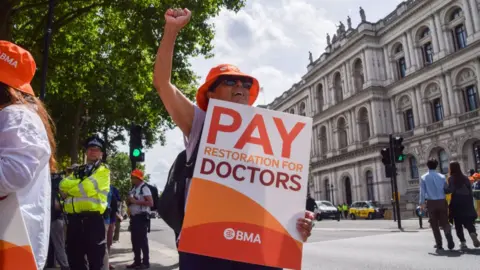In a significant development within the UK’s National Health Service (NHS), Health Secretary Wes Streeting is scheduled to meet with representatives from the British Medical Association (BMA) next week. This engagement aims to address the escalating tensions surrounding resident doctors, who previously labeled as junior doctors, and the looming threat of strikes due to ongoing pay disputes. This meeting comes at a crucial time, with resident doctors planning to initiate a five-day strike commencing on July 25th and concluding on July 30th.
The proposed strike stems from grievances about pay discrepancies. In recent communications, the BMA indicated that strikes could be suspended if the upcoming discussions yield a satisfactory offer that could be presented to its members. However, the government remains firm in its stance, having offered an increase of 5.4% for the current financial year, which they deem sufficient. This situation places both parties at an impasse, with rising concerns among staff regarding the adequacy of the government’s offer in comparison to inflation and rising living costs.
Resident doctors had previously received a 5.4% pay rise that will reflect in their August salaries, following a more considerable increase of 22% across the previous two years. Nevertheless, these medical professionals argue that, in real terms, their salary continues to be about 20% lower than what it was in 2008. The BMA has stated that while they appreciate the recent increments, they still foresee the need for a more structured approach to restoring their pay value relative to previous years.
During a recent statement, Health Secretary Wes Streeting expressed his sympathy towards the improving working conditions for resident doctors but emphasized that salary negotiations would not see significant changes from the government’s current offer. He referred to the planned strike as “unnecessary and unreasonable,” indicating his concern that such actions could detrimentally impact the already beleaguered NHS and the progress made in tackling patient wait times.
Dr. Melissa Ryan and Dr. Ross Nieuwoudt, co-chairs of the BMA’s resident doctor committee, shared a sentiment of frustration regarding the lack of a “credible offer” from the government. They expressed that the impending strike was a last resort due to the failure to produce satisfying negotiations. This statement reflects a broader context, as the resident doctors’ distress over earning issues has led to a record number of strike actions within this demographic, with 11 separate strikes occurring in 2023 and 2024 alone.
Adding to the complexity of the debate, Lord Robert Winston, a prominent figure in the medical community, recently resigned from the BMA in response to the planned strikes. In a public declaration made to The Times, he cautioned against such actions, suggesting that strike actions might diminish public trust in the medical profession, an essential bond in patient-doctor relationships and broader healthcare effectiveness.
Moreover, it’s essential to recognize that the unrest affecting resident doctors in England won’t directly influence their counterparts in Scotland, Wales, or Northern Ireland, as these individuals negotiate salaries and working conditions with their respective devolved governments.
Currently, resident doctors in England earn basic salaries ranging between £37,000 and £70,000 annually for a standard 40-hour work week, with additional compensation for night shifts and weekend work. The recently announced 5.4% increase, effective from August, will be an essential component in the financial equation these healthcare workers assess as they navigate their professional conditions.
The impending discussions between Wes Streeting and the BMA represent a pivotal moment in resolving one of the most heated battles for fair compensation in the NHS, and it remains to be seen whether these talks will lead to a compromise and avert strike actions that could potentially disrupt crucial health services.










